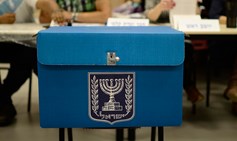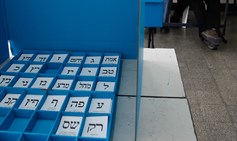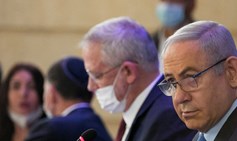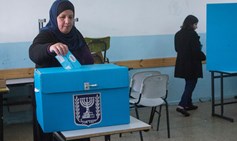2021
Choose another year
Choose another year

On March 23, 2021, Israeli citizens went to the polls for the fourth time in less than two years. The political turmoil into which the country has drifted since the end of 2018 places it as the democracy with the highest frequency of elections and reflects alarming levels of instability and lack of governance. It also illustrates the urgent need to amend the system of government.
The two legislatures elected in the April 2019 and September 2019 elections failed to form a government and were therefore dissolved at the beginning of their term. The elections to the 23rd Knesset (March 2020), like the two previous ones, were held in the shadow of the corruption cases in which Prime Minister Benjamin Netanyahu is suspected and accused and also produced indecisive results. Although the Likud won 36 seats, its best achievement since 2003, the bloc of parties that opposed sitting in the government headed by Netanyahu had a majority of more than 62 seats. Even after the "defection" of Orly Levy-Abeaxis to the right-wing ultra-Orthodox bloc, Netanyahu did not have a sufficient majority to form a government. After consultations with the representatives of the parties, the President of the State appointed Benny Gantz with the task of forming a government. However Gantz found it difficult in view of the imposition of a veto by some of his partners on relying on support of the Arab parties to form the government. In the end, and in order to avoid a fourth election in the midst of the Covid19 crisis, the two candidates for prime minister - Netanyahu and Gantz - reached a compromise.
As part of this compromise, a coalition agreement was signed that led to a profound amendment to the Basic Law The Government in a way that invented a new institutional regime creature: alternate government. At the heart of the coalition agreement was cooperation between the Likud and Blue & White (which split following the move). It was agreed that the government and the 23rd Knesset would serve for three years, and that at the halfway point, Gantz would replace Netanyahu as prime minister. It was further agreed that the government will act according to a parity principle and pass a biennial budget for the years 2020-21. The government, the 35th government, has from the very beginning been characterized by high levels of mutual mistrust between the blue & white bloc and the Likud bloc. It soon became clear that Netanyahu did not intend to implement the agreement and sought to avoid transferring a budget in order to run for re-election when the timing was convenient for him. The Knesset faced dissolution at the end of August 2020, but a last-minute compromise postponed the end and determined that if the 2020 budget is not approved by December 23, the Knesset will be automatically dissolved. Attempts were also made towards approaching this date to extend the budget further, but the lack of trust between the parties, combined with opposition positions of MKs from the Likud and Blue & White blocked the move and led to the automatic dissolution of the Knesset due to non-transfer of budget.
38 lists of candidates competed in the elections, and 13 of those passed the electoral threshold and were elected to the Knesset. Likud, with 30 seats, remained the largest party, well ahead of Yesh Atid (17). However, the bloc of parties loyal to PM Netanyahu received only 52 seats. After Netanyahu failed in his efforts to form a government, the task was handed to Yesh Atid's leader Yair Lapid. Following a complex coalition bargaining process Lapid succeeded to form a government, supported by an eight-party coalition. Under the coalition agreement, Yamina's leader Naftali Bennett was appointed as prime minister and in August 2023 Lapid was supposed to replace him in the position. However, in 1 July 2022 the Knesset voted for early elections and as a result Lapid was appointed as Israel's 14th prime minister.
23.3.2021
6,578,084
3.25%
4,436,365
4,410,052
67.4%
| Party | Votes Count | Number Of Seats | Share Of Votes | List Of Candidates | Platform |
|---|---|---|---|---|---|
| Likud | 1,066,892 | 30 | 24.2 |
Candidates
|
|
| Yesh Atid | 614,112 | 17 | 13.9 |
Candidates
|
|
| Shas | 316,008 | 9 | 7.2 |
Candidates
|
|
| Blue and White | 292,257 | 8 | 6.6 |
Candidates
|
Platform
|
| Yamina | 273,836 | 7 | 6.2 |
Candidates
|
|
| Labor Party | 268,767 | 7 | 6.1 |
Candidates
|
Platform
|
| United Torah Judaism | 248,391 | 7 | 5.6 |
Candidates
|
|
| Yisrael Beitenu | 248,370 | 7 | 5.6 |
Candidates
|
Platform
|
| Religious Zionism | 225,641 | 6 | 5.1 |
Candidates
|
|
| The Joint List | 212,583 | 6 | 4.8 |
Candidates
|
|
| New Hope | 209,161 | 6 | 4.7 |
Candidates
|
|
| Meretz | 202,218 | 6 | 4.6 |
Candidates
|
|
| Ra'am | 167,064 | 4 | 3.8 |
Candidates
|
|
| New Economy | 34,883 | - | 0.8 |
Candidates
|
Platform
|
| Rafa - Rak Briut | 17,346 | - | 0.4 |
Candidates
|
|
| The Pirates | 1,309 | - | 0.0 |
Candidates
|
Platform
|
| Ani VeAta - Israel's People Party | 1,291 | - | 0.0 |
Candidates
|
|
| HaTikva LeShinui | 1,189 | - | 0.0 |
Candidates
|
|
| HaMapatz Hachevrati | 811 | - | 0.0 |
Candidates
|
Platform
|
| Mishpat Tzedek | 729 | - | 0.0 |
Candidates
|
|
| Tzomet | 663 | - | 0.0 |
Candidates
|
|
| Am Shalem | 592 | - | 0.0 |
Candidates
|
Platform
|
| Seder Chadash | 514 | - | 0.0 |
Candidates
|
Platform
|
| Kama | 486 | - | 0.0 |
Candidates
|
Platform
|
| The Impossible - Possible | 463 | - | 0.0 |
Candidates
|
|
| Jewish Heart | 443 | - | 0.0 |
Candidates
|
Platform
|
| Atzmenu | 441 | - | 0.0 |
Candidates
|
Platform
|
| Biblical Bloc Party | 429 | - | 0.0 |
Candidates
|
|
| Olam Chadash | 429 | - | 0.0 |
Candidates
|
|
| Brit HaShutfut | 408 | - | 0.0 |
Candidates
|
|
| The Israelis | 395 | - | 0.0 |
Candidates
|
|
| Shma | 395 | - | 0.0 |
Candidates
|
Platform
|
| Da'am | 385 | - | 0.0 |
Candidates
|
Platform
|
| Manhigut Chevratit | 256 | - | 0.0 |
Candidates
|
|
| Ma'an (Yachad) - LeIdan Hadash | 253 | - | 0.0 |
Candidates
|
|
| Chetz | 226 | - | 0.0 |
Candidates
|
|
| Anachnu | 220 | - | 0.0 |
Candidates
|
|
| Kvod HaAdam | 196 | - | 0.0 |
Candidates
|

Written By: Prof. Ofer Kenig
In the March 2021 elections, Israel's fourth in two years, voter turnout was down throughout the country. Yet a comparison to the last round of elections in 2020 shows how a more substantial downturn in voting in religious and rightwing strongholds resulted in a significant weakening of Netanyahu's Likud party.

Written By: Dr. Dana Blander
In Israel any individual or organization can request the disqualification of an electoral list - also interesting to note that there is no equivalent to the Central Elections Committee in any other democratic state

Written By: Prof. Yuval Shany, Prof. Mordechai Kremnitzer, Dr. Amir Fuchs, Dr. Guy Lurie, Dr. Nadiv Mordechay
Setting sweeping restrictions on Israeli citizens’ ability to return to the country from overseas is extremely problematic from a constitutional perspective and is without parallel in the democratic world

Written By: Yohanan Plesner
In the midst of a fourth election in two years, IDI President Yohanan Plesner sat down with the Tel Aviv Review to discuss how Israel can emerge from the ongoing political crisis that has left it without a stable government, a state budget and an effective response to the COVID-19 pandemic.

Written By: Dr. Arik Rudnitzky
Arab Israelis want to see their representatives in the Knesset and are willing to go out to vote to ensure this happens. Kafr Qassem could be the test case for the larger Arab community who are more likely to vote if they feel that their Knesset members are representing them faithfully.